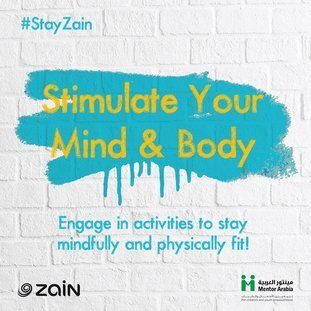
EU adopts new rules to significantly cut packaging waste with re-use targets
The European Union has formally adopted a regulation on packaging and packaging waste. The new ...

Kuwait’s Zain Group launched #Stay Zain campaign for providing mental health tips to parents, children and youth during and after COVID-19 quarantine period.
Zain Group spearheaded this social media campaign in collaboration with the Mentor Arabia Foundation – the regional branch of Mentor International, with a mission to empower Arab children and youth, as a means of prevention of risky behaviors through policies, capacity development, advocacy, knowledge and partnerships.
This regional campaign offers tips for parents, children and youth about how to maintain good mental and physical health, to reduce anxiety and depression, to motivate them to think positively and to avoid negative behavior during and after COVID-19 quarantine period.
It is important to take care not only of the physical safety of children and young people, but also of their emotional health.
The #StayZain campaign is meant to engage the youth, parents and children through digital means, providing one tip daily, in English and Arabic on Zain and Mentor Arabia’s social media platforms (Twitter, Instagram, LinkedIN and Facebook) for a period of 11 days.
A sample of the helpful daily tips include Listen Actively- Our children need to feel heard and safe!; Seek professional Support- Ask for help when children show signs of trauma not resolving relatively quickly!; Emphasize Hope – Focus on things you can control instead of those you can’t control!
This campaign comes in response to the COVID-19 outbreak and its global repercussions, which have impacted everyday life for millions of people.
Children may struggle with significant adjustments to their routines (e.g., schools and childcare closures, physical distancing, home confinement), which may interfere with their sense of structure, predictability, and security.
Young people—even infants and toddlers—are keen observers of people and environments, and they notice and react to stress in their parents and other caregivers, peers, and community members.
They may ask direct questions about what is happening now or what will happen in the future and may behave differently in reaction to strong feelings (e.g., fear, worry, sadness, anger) about the pandemic and related conditions.
Children also may worry about their own safety and the safety of their loved ones, how they will get their basic needs met (e.g., food, shelter, clothing), and uncertainties for the future.
The campaign is meant to offer needed psychological support for people under this crisis.
The European Union has formally adopted a regulation on packaging and packaging waste. The new ...
Inaugurating the Abydos Solar Power Plant in the Upper Egypt governorate of Aswan represents a ...
Businesses that fail to adapt to climate risks like extreme heat could lose up to ...


اترك تعليقا